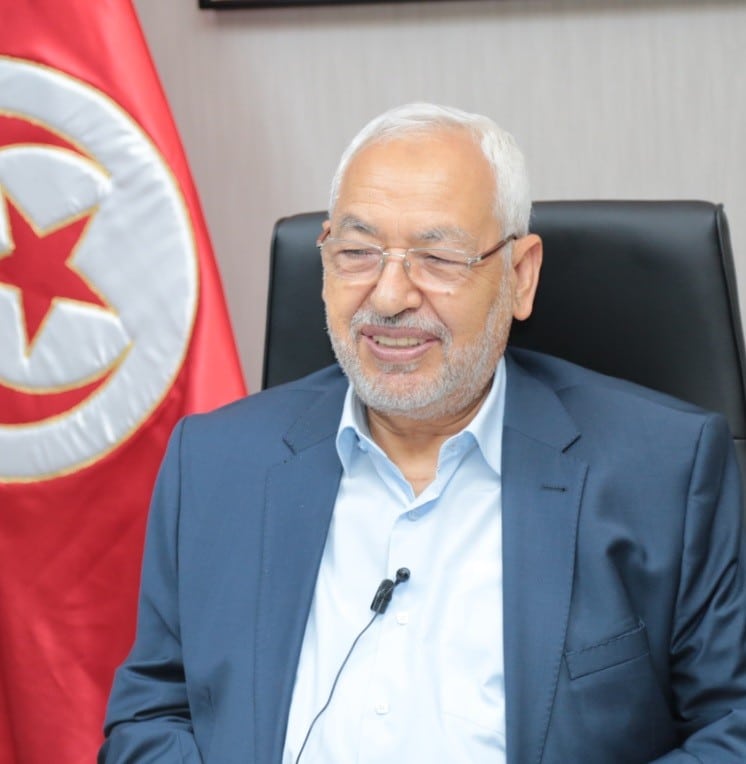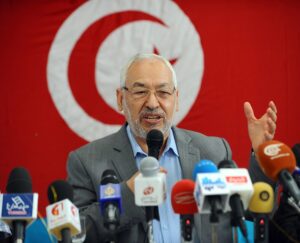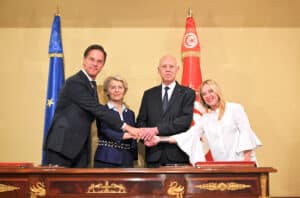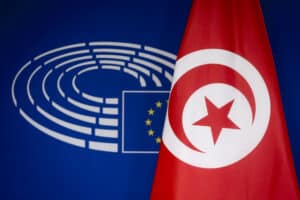Rached Ghannouchi in 2017 (source: Wikimedia Commons)
Last week, Tunisian President Kais Saied issued an electoral law curtailing the role of political parties in Tunisia. Meanwhile, Rached Ghannouchi and Ali Larayedh, leaders of the largest opposition party Ennahda, were summoned by the anti-terrorism police for questioning, after which Larayedh was detained. These events appear to be the latest steps in President Saied’s slow power grab, that started on July 25, 2021, when he invoked emergency measures and suspended parliament.
Reducing influence political parties
During a cabinet meeting on Thursday last week, Saied announced a new electoral law. Under this unilateral law, in the upcoming elections on December 17, voters can choose candidates individually, instead of voting for a party list. The law will weaken the influence of political parties, though it will not exclude them. “We are passing through a new stage in the history of Tunisia towards the sovereignty of the people after previous sham elections,” Saied said to his cabinet, clarifying his motivations.
The major opposition parties have rejected the law and have previously announced that they will boycott the elections in December. They argue the electoral commission overseeing the elections is “not neutral”.
“Terrorism” allegations
Later this week, Ghannouchi and Larayedh, leaders of the largest opposition party Ennahda, were summoned for interrogation on what the party has said are accusation relating to “terrorism”. After Larayedh was questioned for 14 hours, he was detained, on suspicion of “sending Jihadists to Syria,” according to his lawyers.
Ennahda lawyers have described the case as a “farce” and “a form of torture, abuse, a flagrant violation of human rights and an undermining of dignity in fabricated cases and malicious accusations”. Ennahda has accused Saied of executing a “non-democratic coup”. On Saturday, Ghannouchi called the summons “a new attempt to target opponents and a new step towards exclusion”.
Secular parties have accused Ennahda of being lenient towards Jihadist groups, a claim the party has long denied. The current allegations can be seen as part of a wider trend of oppression of Islamist parties under the guise of suspicions of terrorism. This strategy was popular under the former autocratic Ben Ali regime in Tunisia, but also, for example, today in Egypt, under the one-man rule of President al-Sisi, where the Islamist Muslim Brotherhood is the target of brutal oppression.
Support Saied
Both the new electoral law and the interrogation of the Ennahda leaders appear to be Saied’s latest actions in his gradual move towards authoritarianism, that has been taking place since July 25, 2022. The former professor of constitutional law won the presidential elections of 2019 as an independent candidate, presenting himself as an outsider from the Tunisian political establishment. His victory primarily relied on votes from young Tunisians, who were disillusioned with politics and suffered from high unemployment rates.
Saied’s implementation of the emergency measures in July 2021 followed months of protests. Demonstrators demanded solutions for the high unemployment rates, the corona crisis, police brutality and corruption. Initially, Saied’s move received widespread support from the Tunisian population, with polls measuring around 87% approval rates for Saied’s actions. Critics have accused the Tunisian President of democratic backsliding and carrying out a coup.
“The only Arab democracy”
Parliamentary elections are scheduled later this year, on December 17. However, the major opposition parties have announced they will boycott the elections. In the meantime, Tunisia’s political crisis is deepening, and its economic troubles worsening. Nonetheless, Saied still holds support from a significant share of the Tunisian population. The former law professor continues to be seen as a beacon of hope in a corrupt political system by many.
Sources: Al Jazeera 1, Al Jazeera 2, Al Jazeera 3, Africanews
Photo: Wikimedia Commons



